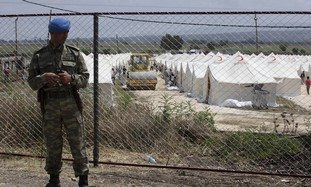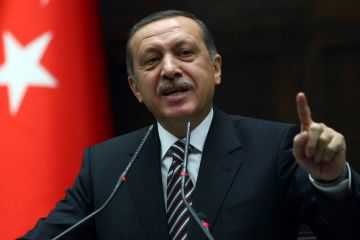* Turkey reserves right to say: Enough
* 24 reported killed after Friday prayers
* Saudi prince says Arab states won’t allow “massacre” (Updates death toll)
By Douglas Hamilton

BEIRUT, Dec 9 (Reuters) – Turkey warned Syria on Friday it would act to protect itself if a Syrian government crackdown on protesters threatened regional security and unleashed a tide of refugees on its borders.
At least 24 Syrians were shot dead as protesters took the streets following Friday prayers and ahead of a general strike called for Sunday, according to a network of anti-government activists reporting events to a website based in Britain.
Other activist sources put the toll as high as 37 dead.
Ten were killed in Homs, the hub of the nine-month-old revolt, where televised footage showed demonstrators against President Bashar al-Assad chanting “Syria wants freedom” and “Bashar is an enemy of humanity”.
Turkish Foreign Minister Ahmet Davutoglu did not say what action Ankara might take, but he made clear Turkey would not hesitate to insulate the region’s security from tumult in Syria. Turkey shares a 900 km (560 mile) border with Syria.
“Turkey has no desire to interfere in anyone’s internal affairs. But if a risk to regional security arises, then we do not have the luxury of standing by and looking on,” Davutoglu told reporters in Ankara.
Peaceful demonstrations calling for reform began in Syria in March, inspired by the Arab Spring, but were met almost from the outset by lethal force.
“If a government that is fighting its own people and creating refugees, is putting not only their own security at risk but also that of Turkey, then we have a responsibility and the authority to say to them: ‘Enough!’” Davutoglu said.
Adding to the condemnation, a senior Saudi prince said Arab states would not turn a blind eye to violence in Syria.
Former Saudi intelligence chief Prince Turki al-Faisal, seen as influential though no longer holding public office, told a conference in Vienna he believed the Arab League would not “sit back and allow the continued massacre of the Syrian people”.
Activists say about 4,600 Syrians have been killed in nine months of protest and violent state suppression. Hundreds have fled over the border to Turkey which has established refugee camps.
MISTAKES
President Assad says some “mistakes” may have occurred but casualties have been overwhelmingly from the security forces, targeted by “armed terrorist gangs” who are motivated and directed by unnamed foreign influences.
Syria has been hit by United States and European Union economic sanctions and suspended from the Arab League which is also threatening to impose sanctions.
Russia and China, however, have effectively blocked any similar move at the United Nations and Moscow is warning the West not to interfere in the affairs of its longtime Arab ally.
The UK-based Syrian Observatory for Human Rights reported 28 demonstrations in southern Deraa province, calling for the overthrow of the government, on what protesters are calling the “Friday of the Strike of Dignity” planned over the weekend.
Security forces fired into a crowd outside the mosque in Al-Qusayr in Homs province, the Observatory said. Troops surrounded protesters as they came out of two mosques in the eastern city of Deir al-Zor, and two children were killed in districts of Homs, the activist website reported.
State television also reported violence but gave a different account. It said a girl was shot by “terrorists” in Deraa and civilians wounded by “terrorist armed groups”.
UN WANTS ACCESS
Davutoglu has proposed that contingency plans be made for a buffer zone along the Syrian border should violence escalate to the point where a mass exodus is threatened.
The United Nations said it was impossible to assess the situation until Damascus admits humanitarian relief teams.
“I repeat my call to the Syrian government to really let us in,” said Valerie Amos, U.N. Under-Secretary-General for Humanitarian Affairs and Emergency Relief, in Stockholm.
“If, as the government say, they have nothing to hide, then I think allowing us in to see that is the case and to do a proper assessment of what the implications of this are for the people of Syria is absolutely critical,” Amos said.
Syrian National Council leader Burhan Ghalioun said he had pressed the leader of the Free Syrian Army, an umbrella group of armed rebels, to cease offensive operations that could provoke civil war.
“We want to avoid a civil war at all costs,” he told Reuters in Vienna.
Assad this week denied all responsibility for civilian deaths and said he had given no shoot-to-kill order.
NATO wants him to step down. But Russia, China, Iran and Brazil, among others states, say the West should not interfere.
Syrian state television on Thursday aired confessions by “terrorists” bent on destabilising the country by attacking security forces, killing and sabotage.
It said they admitted making and planting bombs but did not elaborate on their alleged political motive for such attacks.
Anti-government activists say three unarmed civilians have died for every security force member killed since March. They say Syrian interrogators use torture to obtain confessions.
(Additional reporting by Tulay Karadeniz in Ankara, Sylvia Westall in Vienna, Daniel Dickson in Stockholm, Dominic Evans and Laila Bassam in Beirut; editing by Rosalind Russell)
via WRAPUP 3-Turkey warns Syria not to provoke regional crisis | Reuters.






